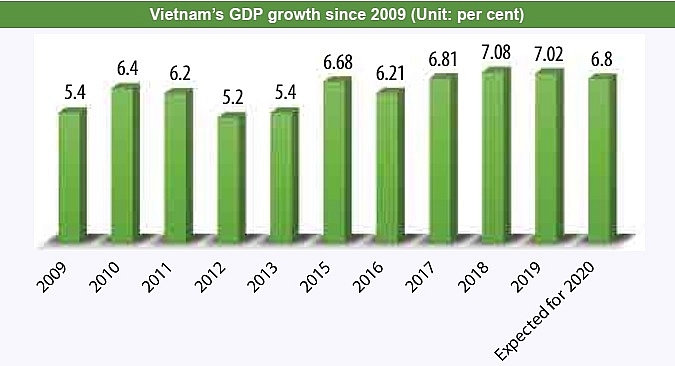Tran Quoc Phuong, Deputy Minister of Planning and Investment, talked about these achievements laying down firm groundwork for Vietnam to accomplish its goals for 2020.
The new year has begun with new prospects. Do you think that what Vietnam has achieved in 2019 will usher in a new outlook for the economy?
 |
|
Tran Quoc Phuong, Deputy Minister of Planning and Investment
|
I think so. In 2019, the Vietnamese economy grew 7.02 per cent, with a scale of $266 billion and a per capita income of $2,800. These figures are quite significant.
Additionally, there have been other eminent results such as the stable macro-economy and low inflation at 2.79 per cent, which is lower than the National Assembly’s (NA) target of 4 per cent. The financial and monetary market has been well regulated, with foreign currency reserves of $80 billion. Also, Vietnam recorded $517 billion in export-import turnover, with a $10 billion trade surplus. Total public debt has reduced to 56 per cent of GDP, and we have seen a record number of 138,000 newly-established enterprises.
This reflects both quantitative and qualitative economic growth, with competitiveness improved, especially amid global uncertainties and headwinds such as trade conflicts and strongly fluctuating market prices. Besides that, these achievements are also significant in the context of domestic difficulties such as natural calamities and epidemics, as well as challenges in local production and business.
What has enabled the economy to reap such impressive attainments?
These achievements have mirrored the timely and effective direction of the government and the prime minister. They have also required solid efforts from ministries, agencies, and localities, as well as people and enterprises in implementing the nation’s socio-economic development plan.
Right from the beginning of the year, the government and the prime minister took drastic moves in macro-economic monitoring, with the enactment of two hallmark resolutions on crafting actions for socio-economic management, and on improving the domestic business climate.
Different from previous years, in 2019 a scenario for economic growth was compiled and released in addition to Resolution 01 on key tasks and solutions to implementing the country’s socio-economic development plan. This helped the government, ministries, localities, and agencies to take the initiative in implementing solutions on socio-economic development.
Though the NA set an economic growth target of 6.6-6.8 per cent for 2019, the government showed its strong determination to reach the rate of 6.8 per cent. In the context of difficulties of the global and regional economies, it would be a hard job to hit this target.
In fact, the Ministry of Planning and Investment (MPI), which is the advisory agency of the government in solutions for macro-economic management, felt quite nervous about accomplishing this task at several points.
However, weathering all difficulties, all economic scenarios were designed and updated quarterly in the year so that the government could take the initiative in its guidance. Besides, all developments of the global economy, especially the US-China trade war, were also frequently updated.
In the context of slow disbursement of public investment affecting economic growth, the prime minister enacted directives and frequently issued guidances and directions in order to boost such disbursement in an effective manner so that capital for state-funded projects can have sufficient investment capital and can be completed and come into operation as soon as possible.
The results are becoming visible now. The Vietnamese economy has witnessed a successful year when for the second time in a row all 12 key goals of the economy were reached or even exceeded. Last October at the eighth session of the 14th NA, the government reported to the legislature that five goals were exceeded and seven goals were hit.
However, as of now, the number of exceeded goals is seven. The two additional exceeded goals are very important – GDP growth and export growth.
Specifically, the GDP growth target has been quite impressive, at more than 7 per cent. This has been the second year in a row that Vietnam has reaped such a rate. This has demonstrated the strong efforts and determination of the government, ministries, localities, and sectors in the year, especially when the economic growth model is being transformed to a paradigm when growth is less dependent on exploiting natural resources and credit growth, and more reliant on science-technology and innovation.
 |
How is the economy expected to perform in 2020?
The year is extremely important for Vietnam’s development as it is the last one of the government’s tenure and will make decisive contributions to the successful accomplishment of the resolution of the 12th Party Congress, of all strategic targets under the 2011-2020 Socio-economic Development Strategy, and the 2016-2020 Socio-economic Development Plan.
Thus the tasks for 2020 will be quite heavy. The whole nation will not only have to realise these targets, but also lay a firm foundation for the stronger development of the country in the next period of time.
The NA has adopted a GDP growth rate of 6.8 per cent for 2020. This rate is proper in the context of difficulties in the global economy and the domestic economy. This target will help ensure harmony between economic growth and inflation control, and also ensure all major balances of the economy.
At the same time, this is also the way in which the NA enables the government to direct the economy into improving productivity, quality, and effectiveness, instead of pursuing high economic growth at all costs.
It is clear that the government has attached more importance to enhancing the quality, sustainability, self-reliance, and competitiveness of the economy.
In fact, when compiling the government’s Resolution 01, we have designed an economic growth scenario for 2020 and are looking to implement a bigger target: not only reaching the economic growth rate of 6.8 per cent, but also driving the economy to bigger fruits as it has done successfully in 2018 and 2019.
So all the tasks will be quite tough, especially when there have been great uncertainties in the global and regional economies, with a tense geopolitical situation, and a tense trade situation full of risks.
In the country, the economy remains mired in difficulties, especially with African swine fever still negatively impacting the government’s efforts in controlling inflation and boosting economic growth.
However, we must do our utmost to accomplish the tasks. The MPI does believe that if all the political system makes further efforts and enhances its responsibility and effectiveness, in line with the government’s 2020 slogan of “Discipline, integrity, action, responsibility, creativity, and effectiveness”, the economy well reach all its goals for 2020.
What measures will be taken to boost economic growth in 2020?
In Resolution 01 just enacted, there are six key groups of direction and 10 breakthrough solutions formulated by the government for 2020. For instance, efforts must be made to continue building up and perfecting the law system in a synchronous, modern, and feasible manner, ensuring the country’s international integration and meeting the nations’ requirements in innovation and development.
Besides that, the law must be enforced strictly. The macro-economic foundations must be strengthened and inflation must be controlled, with all major balances of the economy be ensured. This will help create rapid and sustainable development for the economy, which includes the improvement of the effectiveness in public debt management, and due debt payment, and help ensure international high rating for the nation’s credit in 2020.
We will also need to beef up the restructuring of the economy with the renewal of the growth model, and improvement of the economy’s labour productivity, quality, effectiveness, and competitiveness in a more practical and effective manner.
In addition, there must be plans on bettering the rating of the domestic business climate, announcing enterprise-oriented whitebooks, and encouraging the development and participation of the private sector in investing in, and constructing, large-scale projects.
With these synchronous solutions, along with great efforts and determination of the government, ministries, agencies, and localities, we do believe that Vietnam will continue seeing another successful year in 2020. VIR
Nguyen Duc
 Vietnam has produced significant economic achievements that have simultaneously strengthened the country’s international status.
Vietnam has produced significant economic achievements that have simultaneously strengthened the country’s international status.